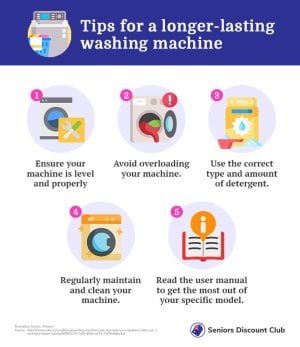The secret to a longer-lasting washing machine: Avoid wear and tear with these easy steps
- Replies 5
As members of the Seniors Discount Club, we're all about finding ways to save money and make our appliances last as long as possible.
When it comes to washing machines, these workhorses of the household are high up there, with dishwashers as some of the most frequently used appliances in our homes.
According to Colin Jones, a category expert from Appliances Online, a washing machine should generally last eight to 12 years.
If you own a front loader machine, there's good news for you; these types of washers typically outlast top loaders due to their fewer mechanical parts and lower water usage, resulting in less wear and tear over time.
However, there are plenty of things that we could be doing, unknowingly causing our washing machines to have a shorter lifespan or need repairs more often than they should.
Don't worry, though; we're here to help you learn what mistakes to avoid and how to maintain your washing machine so it can serve you better for years to come.
Overloading: A common mistake with serious consequences
One major practice to avoid is overloading your washing machine. Not only does this put undue strain on its components, but it also prevents your clothes from being adequately washed.
As Jones explains, ‘Incorrect loading can cause undue strain on components causing them to fail, which will affect your wash results as the water and detergent are unable to clean your clothes correctly’.
Adding items that don't belong in the washing machine, such as shoes, is another cause for concern.
This can lead to excessive vibrations, which, over time, will affect the machine’s components.
The principle of detergent use
Detergent usage is another factor that can contribute to the wear and tear of your washing machine.
It's essential to find the right balance in terms of the amount and type of detergent used. Using too much detergent will lead to extra suds and rinse cycles, whereas using too little won't adequately clean your clothes.
In addition to the amount of detergent, it's important to use the correct type. Using top loader detergent in a front loader machine, for example, can cause excessive suds and damage the electronics.
‘While it's great that a lot of front load washers now have inbuilt sensors that detect you have added too much detergent, and will remove the excess detergent by pumping it out with clean, fresh water, not using the correct amount of detergent will lead you to use two or three times more water to get to the right detergent level,’ Jones explained.
Maintenance is key
To keep your washing machine in tip-top shape, regular maintenance is essential. This includes cleaning filters, monitoring for leaks, and, for front loader machines, preventing and/or removing mould from the door seal.
Jones suggests leaving the door slightly open after use to allow airflow and prevent mould buildup.
‘With a front load washer, to prevent mould on the rubber door seal, you need to keep your door slightly open [after use] to allow air to pass over and prevent mould, and a simple wipe over your machine will maintain a new look,’ Jones shared.
Surprising factors that can cause wear and tear
Did you know that not using your washing machine often enough can also lead to wear and tear? Jones explains that when a machine sits unused for extended periods, components like belts and bearings that require movement can dry out.
Additionally, power surges or storms can lead to sudden damage to your washing machine's electronics. To prevent this, invest in a power surge guard and attach it to the power point, then connect it to the cord to protect your machine.
What if it's time to repair or replace your machine?
If your washing machine is reaching the end of its lifespan or you're facing expensive repairs, consider the cost of the repairs compared to purchasing a new model.
At this point, it might be wiser to invest in a new washing machine that comes with a comprehensive factory warranty.
As Jones explained: ‘In addition to repair costs, other factors to consider are the machine's age, frequency of previous repairs, parts availability (typically limited to 10 years by suppliers), and the energy efficiency of the old model compared to newer models.’
Also, remember to check your warranty and consult your manual before considering repairs or replacement.
By taking these simple steps, you'll be well on your way to prolonging the life of your washing machine, saving money on repairs, and ensuring clean clothes for years to come.

If you’ve got any tips or tricks for washing machine maintenance, be sure to share them in the comments!
When it comes to washing machines, these workhorses of the household are high up there, with dishwashers as some of the most frequently used appliances in our homes.
According to Colin Jones, a category expert from Appliances Online, a washing machine should generally last eight to 12 years.
If you own a front loader machine, there's good news for you; these types of washers typically outlast top loaders due to their fewer mechanical parts and lower water usage, resulting in less wear and tear over time.
However, there are plenty of things that we could be doing, unknowingly causing our washing machines to have a shorter lifespan or need repairs more often than they should.
Don't worry, though; we're here to help you learn what mistakes to avoid and how to maintain your washing machine so it can serve you better for years to come.
Overloading: A common mistake with serious consequences
One major practice to avoid is overloading your washing machine. Not only does this put undue strain on its components, but it also prevents your clothes from being adequately washed.
As Jones explains, ‘Incorrect loading can cause undue strain on components causing them to fail, which will affect your wash results as the water and detergent are unable to clean your clothes correctly’.
Adding items that don't belong in the washing machine, such as shoes, is another cause for concern.
This can lead to excessive vibrations, which, over time, will affect the machine’s components.
The principle of detergent use
Detergent usage is another factor that can contribute to the wear and tear of your washing machine.
It's essential to find the right balance in terms of the amount and type of detergent used. Using too much detergent will lead to extra suds and rinse cycles, whereas using too little won't adequately clean your clothes.
In addition to the amount of detergent, it's important to use the correct type. Using top loader detergent in a front loader machine, for example, can cause excessive suds and damage the electronics.
‘While it's great that a lot of front load washers now have inbuilt sensors that detect you have added too much detergent, and will remove the excess detergent by pumping it out with clean, fresh water, not using the correct amount of detergent will lead you to use two or three times more water to get to the right detergent level,’ Jones explained.
Maintenance is key
To keep your washing machine in tip-top shape, regular maintenance is essential. This includes cleaning filters, monitoring for leaks, and, for front loader machines, preventing and/or removing mould from the door seal.
Jones suggests leaving the door slightly open after use to allow airflow and prevent mould buildup.
‘With a front load washer, to prevent mould on the rubber door seal, you need to keep your door slightly open [after use] to allow air to pass over and prevent mould, and a simple wipe over your machine will maintain a new look,’ Jones shared.
Surprising factors that can cause wear and tear
Did you know that not using your washing machine often enough can also lead to wear and tear? Jones explains that when a machine sits unused for extended periods, components like belts and bearings that require movement can dry out.
Additionally, power surges or storms can lead to sudden damage to your washing machine's electronics. To prevent this, invest in a power surge guard and attach it to the power point, then connect it to the cord to protect your machine.
What if it's time to repair or replace your machine?
If your washing machine is reaching the end of its lifespan or you're facing expensive repairs, consider the cost of the repairs compared to purchasing a new model.
At this point, it might be wiser to invest in a new washing machine that comes with a comprehensive factory warranty.
As Jones explained: ‘In addition to repair costs, other factors to consider are the machine's age, frequency of previous repairs, parts availability (typically limited to 10 years by suppliers), and the energy efficiency of the old model compared to newer models.’
Also, remember to check your warranty and consult your manual before considering repairs or replacement.
By taking these simple steps, you'll be well on your way to prolonging the life of your washing machine, saving money on repairs, and ensuring clean clothes for years to come.
Key Takeaways
- A washing machine should generally last eight to 12 years, with front loaders typically outlasting top loaders.
- Overloading, using the wrong detergent, and neglecting general care advice for washing machines can shorten their lifespan and result in more frequent repairs.
- To ensure washing machines work well for as long as possible, level the machine, use the right detergent, read the user manual, and schedule regular maintenance reminders.
- If the cost of repairs is the same or more than a new model, especially if the washing machine is old, it might be wiser to allocate the cost toward a new machine with a comprehensive factory warranty.











